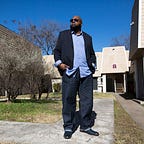Compassion — An Antidote To Mass Incarceration
Compassion is an antidote we haven’t given a fair shot, in my opinion, when it comes to mass incarceration. There’s a nebulous theory that we can solve America’s incarceration epidemic by not releasing people convicted of violent offenses, even though the bulk of folks in state prisons are there for violent convictions. Writ large, were we to release every non-violent drug offender — our prisons would still be full and justice would still be stymied. For context, I was a victim of a violent crime before I was ever convicted of one. Being big and black disqualifies you from being impacted by the trauma of violence and precludes you from societal, judicial and legal compassion.
Choosing to sell drugs put me in a game I didn’t know the rules to and forced decisions I wasn’t prepared for, but had a predisposition for. You see, there’s over a hundred years of trauma caused by incarceration and violence embedded in my DNA. Every male in my family with my last name, save my father and my sons, have either done time or died by a violent act. On that hot, muggy Sunday night I was robbed, so was my future until I encountered compassion. Compassion changed my life, my trajectory and gave me the wherewithal to become more than the worst day of my life, for the rest of my life.
My advocacy is the result of my receiving compassion from someone I thought was my victim’s father, but was actually his uncle. I met him shortly after I had been convicted of voluntary manslaughter and was awaiting transfer to prison from the local county jail. They called him Cheesy and he showed me a modicum of compassion and forgiveness in a place where compassion can be fatal. That act of compassion has forever molded me. He didn’t have to forgive me, but he did, even before I forgave myself.
When I got the call from the reporter for a quote, I didn’t know it was for a story profiling the mother of my victim. While for some on my team it was a political moment to make a public apology, I saw an opportunity to hold space for someone I had harmed. For me, it was more important to provide a space for healing and transformation, than it was to plead my case to the voters publicly. My victim’s mother had every right to feel everything she was feeling and I had no right to diminish that with a public apology. Not everyone would agree with me now and that’s okay, folks didn’t agree with me then either. I’ll tell you, like I told my team, “The healing isn’t about you — it’s about us.”
If we are ever to reverse the trend of mass incarceration it’s going to take a deep commitment to compassion and reconciliation. The violence that has been leveled on our communities in the name of justice, was ingested and in turn redistributed vicariously by folks like me. Correcting judicial actions using clemency as a guide, will traverse us down a path to allow us to see an end to mass incarceration. Compassion creates a space for those that have been harmed and those who have been involved in the harming to experience transformative healing in an authentic way. Choosing compassion over punishment, provides a way for people like me not to be the worst days of our lives, for the rest of our lives. Compassion creates a space for those that have been harmed and those who have been involved in the harming to experience transformative healing in an authentic way. Choosing compassion over punishment, provides a way for people like me not to be the worst days of our lives, for the rest of our lives.
